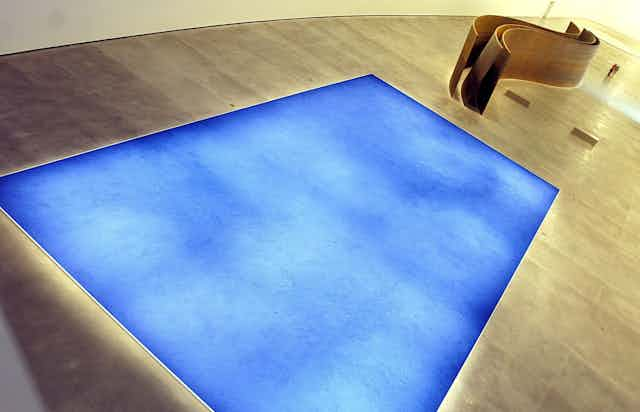A rainy afternoon in March 2020, two weeks before the world came to a halt. I am in Paris celebrating my birthday with my partner. We are at the digital art gallery Atelier des Lumières, enveloped in the cool blue light of French artist Yves Klein’s monochrome blue paintings – a colour so overwhelming we struggle to reconcile it with the grey city outside when we finally emerge.
Klein liked to use one colour, his signature blue, over an entire canvas. His vision was revolutionary: using a single colour was how he freed himself of preconceived notions of what art should be.
Fast forward ten months and lockdown is here again. I am in my kitchen, in a team meeting on Zoom. I listen in but my thoughts start to drift off, and I find myself thinking about my place in the world.
This is not just because I have always had to negotiate that – as an immigrant, a Syrian, a woman, an early-career academic, a new British citizen. Or because questions of identity and belonging are personal research interests. But because every lockdown comes with similar unresolved questions about who we are in the midst of what is going on around us and what really matters to us.
In my work, I have developed a keen interest in migrants’ sense of belonging and how they construct it. Through interviews with migrants I am reminded that belonging is practised, performed and negotiated; that at times of uncertainty, our need for belonging and meaning is at its greatest.
The rootlessness many of us have experienced in lockdown is not so different to the one we suffer when we migrate, and that meaning and reassurance can be found in different things depending on who we are, our experiences and our view of the world.
Sound and silence
I often turn to art, literature and music for meaning and reassurance. Grappling with existential lockdown questions, I think of Klein’s paintings in Paris. All that blue, its loud abundance spilling out beyond the confines of the canvas into rooms, over walls, over people. For me the effect is soothing at a time of social isolation and uncertainty that left us starved of connection and belongingness.
Klein, a 20th-century artist and provocateur, had a unique commitment to unicolour, a fetish if you like, that he daringly carried into music, in his rebellious Symohonie Monotone-Silence.
It is a symphony that “exists outside of the phenomenology of time”, the “one unique continuous ‘sound’ drawn out and deprived of its beginning and of its end”, as Klein explains in his Chelsea Hotel Manifesto. Perhaps now is a good time to confront Klein’s minimalist take on music, presenting life “in the void” – lockdown makes his symphony a work whose time has come.
It first rang out at 10pm on March 9 1960, in the grand salon of art dealer Maurice d’Arquian’s Galerie Internationale d’Art Contemporain in Paris, before an audience of 100 people. Three nude models walked on to a stage, covered their bodies with blue paint and imprinted themselves on white paper.
The voices of the choir and the instruments of the orchestra resounded in a single, continuous note (D major) for 20 minutes, followed by a further 20 minutes of “performed” silence. Now Klein’s piece has rarely seemed more contemporary, feeling very much like a disconcerting musical interpretation of our strange lockdown experience: life as ongoing noise – then abruptly discontinued.
Time to open up
I am no stranger to lockdowns or aloneness. The Syrian war, rumbling on into its tenth year, was the first of these socially alienating experiences that we Syrians have had to endure. This lockdown, like Klein’s symphony, is relentless in its assault on my senses. But that is not necessarily a bad thing.
While physically restricting, lockdown for me has also been redeeming mentally. It has made me think deeply about the way we lived before with one another, and reconsider some of the most vital experiences of the human condition: frailty, shame, guilt, desire, fear, freedom, belonging, love – life and death.
I now believe that the old normal may have seemed like order, but the truth is it was more like a tyranny – focusing on too many things, often less important things, at the expense of our children, relationships and mental and physical health. In the busyness of my days, I had forgotten about the voices silenced by violence, oppression, poverty, hunger, war, prejudice, racism – those whose “lockdown” is continuous and might last long after ours has ended.
It has made me rethink belonging, an important element in understanding who we are in times of separateness. Perhaps lockdown is an opportunity to explore new ways of being and belonging in the world that transcend binary options, places and borders, and reinstate equilibrium by belonging to what we relate to: our humanity – our shared struggles. Perhaps putting down roots is not only about place attachment or the permanence of it, as scholars argue, but about commitment to the ebb and flow of the human condition.
Before his death, Klein explained the motivation for creating his symphony. He wanted a “silence whose existence in our communal space is immune to the destructive qualities of physical noise”. Perhaps, being forced to stop during lockdown – like the contrast of Klein’s 20 minutes of a single note followed by the nothingness – is an invitation to us all to cherish silence and protect it from the tyranny of life’s constant noise.
It is an opportunity to open up fully to this strange experience, to evaluate and draw something better and stronger from it, like being washed clean by an ocean of Klein’s blue, spilling its cool atmosphere out into our lives, bringing a chance to pause, reflect and be soothed.

